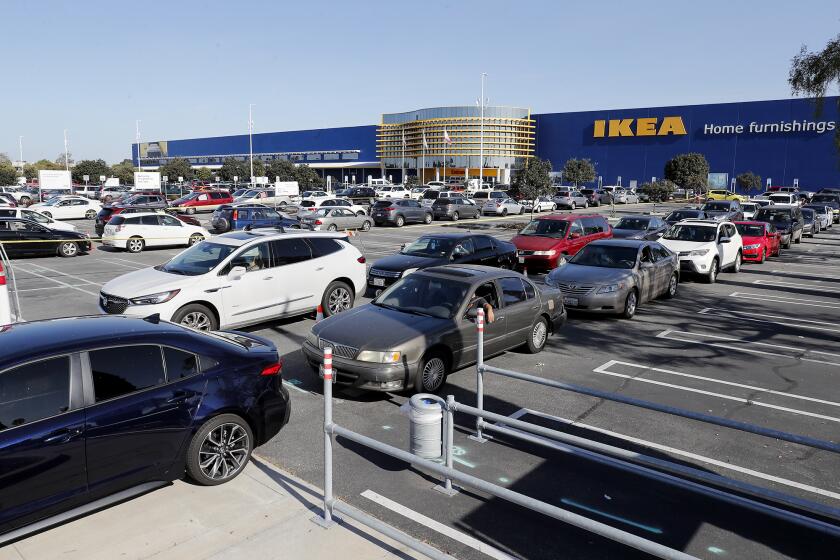Costa Mesa’s Measure Q legalized retail cannabis in a single vote, but drafting its laws is much trickier

Although Costa Mesa voters in November overwhelmingly supported legalizing the retail sales and delivery of cannabis inside city limits, determining the details of how to implement Measure Q and its allowances and prohibitions is a complicated matter.
Just ask members of the city’s planning commission, who on Monday considered a draft ordinance establishing a framework by which business owners may seek permits to operate marijuana dispensaries in commercially zoned areas or set up delivery services.
It expands upon voter-approved Measure X, which allows for the manufacture, processing, distribution, testing and research and development of cannabis within a primarily industrial “green zone.” Cultivation of marijuana is still prohibited by law.
The proposal before commissioners, in part, followed Measure Q ballot language stipulating such uses would not be allowed within 1,000 feet of childcare centers, K-12 schools, playground and homeless shelters, described collectively as “sensitive uses.”
It further imposed a 600-foot buffer between storefronts and youth centers and excluded properties that have been involved in illegal cannabis sales or delivery in the last five years. Deliveries, under the new law, would cease at 10 p.m.
City staff have estimated a 7% gross retail tax levied on permitted retail cannabis operations could generate more than $3 million annually, although taxes imposed on Measure X businesses would officially drop from 6% to 1%, codifying a motion made by the council in March, with marijuana testing enterprises paying no tax.
Under the proposal, businesses currently operating in the city’s green zone could amend their conditional use permits to include a non-storefront retail operation by seeking a minor CUP approved by a city zoning manager and subject to appeal and city council or planning commission review.
“We’re very happy to have that partnership and the generosity of a business that’s so prominent and is willing to give back,” said City Manager Lori Ann Farrell Harrison of the first shelter to be outfitted by the Swedish retailer.
Despite a robust discussion with viewpoints on both sides of multiple issues, commissioners agreed serious revisions would have to be made before they could recommend the new regulation to the City Council.
Commissioner John Stephens — a former council member who sat on an ad hoc Measure Q committee — said he wasn’t aware the additional 600-foot buffers for youth centers would be mandated by the ordinance, which city staff said was done to comply with state language.
Stephens said such a restriction would cut the number of viable properties for retail cannabis nearly in half, from around 544 to 288, and affect the city’s ability to generate revenue without seriously protecting children.
“That was not in Measure Q, and I don’t think we have any obligation to add it,” he said. “This idea that the concept of these buffers was to insulate children from the cannabis dispensaries wherever those children may go, I don’t think that was the intent, and it’s not possible to do that.”
Chair Byron de Arakal said he would not support an ordinance without a mandated distance from places where youth recreate.
“Just because the kids are in a place where they’re doing something that isn’t part of a school doesn’t make them any [less] vulnerable to being close to a retail cannabis facility,” he said.
Commissioner Russell Toler wondered aloud whether buffers between cannabis businesses and sensitive uses would simply prohibit dispensaries from opening near a daycare, or also limit the number of places a daycare could go. He said good planning lies in encouraging spaces for children and young people, not prohibiting them.
Further consideration was given to suggestions in the ordinance that retail establishments may not be operated by, or employ, convicted felons within certain parameters.
Vice Chair Kedarious Colbert and Commissioner Jenna Tourje acknowledged historical disparities in the arrest and conviction of minorities, in particular Black Americans, for felony crimes and drug convictions have created unfair circumstances that should not be perpetuated on the dais.
“As we continue to learn more about the cannabis industry and try to rectify some of the ills of the past, you will find us seeking ways to remedy some inconsistencies,” Colbert said. “I don’t think we’ll get this perfect — there’s a lot to be learned here.”
Commissioners are expected to continue their review of the city ordinance during a March 22 meeting.
All the latest on Orange County from Orange County.
Get our free TimesOC newsletter.
You may occasionally receive promotional content from the Daily Pilot.





